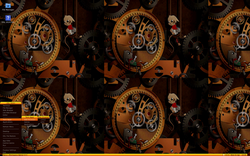Review: Damn Small Linux 2024
Quoting: DistroWatch.com: Put the fun back into computing. Use Linux, BSD. —
The DSL website says the project's mission is to keep older computers running, saving them from unnecessary retirement: "This project is meant to service older computers and have them continue to be useful far into the future. Such a notion sits well with my values. I think of this project as my way of keeping otherwise usable hardware out of landfills."
I think the project is doing a good job. From what I have observed so far, the new sub-700MB version of DSL does a great job of walking the line between supporting older equipment while still being useful and somewhat up to date. Some lightweight projects are so minimal or so alien in their approach that I find them difficult to navigate. A less experienced Linux user probably wouldn't handle something like SliTaz or Tiny Core Linux gracefully.
The DSL project manages to find a good balance between supporting older equipment (32-bit machines using CD-ROM drives are supported) while also offering a fairly familiar experience. The JWM and Fluxbox window managers are presented in a way that should be fairly comfortable to Linux users and people who were running versions of Windows from 10 to 20 years ago. We're given two working web browsers, a decent file manager, some small utilities, a few games to pass the time (a benefit on older equipment), and even some basic office functionality. Plus, if we want more modern software we can pull it in from the latest stable version of Debian.
I think it's telling that after three or four days of playing with DSL, the one serious complaint I could come up with was it didn't work with UEFI mode. Since all computers from the era DSL is targeting should support Legacy BIOS mode, this should be a non-issue for people who want to run DSL. There were a few minor issues, like having trouble switching themes or the update utility getting stuck in a loop, but nothing serious. These will probably get fixed by the next release and there are simple workarounds.
All in all, the new version of DSL performed better than I expected and I think the distribution does an unusually fine job of balancing the limited hardware of older machines while being functional and friendly.

